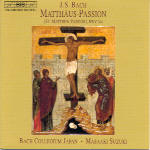Masaaki Suzuki’s Cannes Classical Award-winning performance of the St. John Passion was exceptional, and raised high expectations for this successor. While very good, this isn’t quite on the same level. What made Suzuki’s St. John so fine was the dramatic continuity he found in a work that Bach treated, and which sometimes sounds, more or less like a patchwork. The St. Matthew Passion, on the other hand, is as tightly put together and solidly constructed as the buildings in which it was originally performed. It’s also a bigger, darker, grander piece, and it’s these “large” elements that Suzuki doesn’t quite realize as successfully as, say, Herreweghe in his outstanding recent recording. His “crowd” choruses, for example, are a bit lightweight in tone and lack fierceness when the words call for it, while the chorales may be flowing, but at the expense of a certain gravitas.
The arias are generally nicely done, and both Gerd Türk (Evengelist) and Peter Kooij (Jesus) sing excellently, but soprano Nancy Argenta isn’t in her best voice, and I would also prefer a real contralto to Robin Blaze’s countertenor (if you’re going to use females in the chorus and for the other solo soprano roles, what’s the point in choosing a male alto?). Despite the excellence of the playing, I can’t help thinking that perhaps Suzuki and his admirable musicians are just a little bit intimidated by the work itself, afraid to dig in and realize all of the pity and terror that Bach wrote into it. Don’t get me wrong: this isn’t by any means bad. It’s just that there are other performances, from Klemperer, to Harnoncourt, to Herreweghe, that make the music sound, well, special, as any great reading of this piece simply must.
































